
The Locanda dello Spuntino, Grottaferrata
Less than 30 minutes from Fiumicino is the restaurant Taverna dello Spuntino, which we'd enjoyed on that earlier trip to Frascati and vowed to return to after an amazing culinary experience. The restaurant is located within the hotel Locanda dello Spuntino and we choose to stay at this gem of an inn for our first night back in Italy.
The staff at the reception area set the tone for our brief stay. They were warm, welcoming, and projected the feeling that they were genuinely glad that you chose their hotel. We found this excellent four-star hotel to be charming and a great value for the money. (Something to note… the Italian star rating system is a reference point to consider when making a hotel reservation decisions in Italy… not absolute, but as another reliable data point.)
This boutique inn was recently restored with loving hands and extremely skilled craftsmen. There are ten unique rooms so please go to its webpage for more details and book early, as it is popular!
The restaurant once again was a gastronomic delight and the hotel surpassed our expectations.

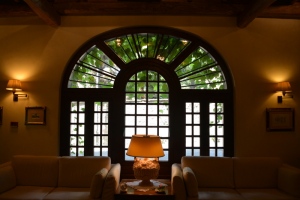
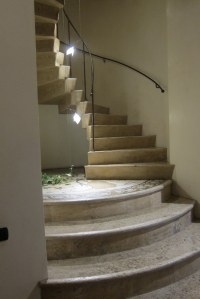
The History of Grottaferrata
Grottaferrata dates back to 1004 with the Basilian Monastery of Santa Maria, founded by Saint Nilus the Younger. Over the years, this famous Byzantine-Greek monastery was known by many names, and finally settled on The Abbey of Santa Maria di Grottaferrata (pictured below).
The legend goes that at the spot where the abbey now stands, the Virgin Mary appeared and requested that Saint Nilus create a church in her honor. Today it is the last of the many Byzantine-Greek monasteries and the monks (Catholics of the Byzantine-Greek rite) follow the teachings of St. Nilus and St. Bartholomew and still live and work within these ancient walls.


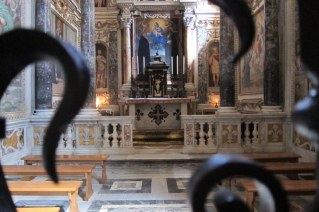
While in Grottaferrata, take your time, be a slow traveler, and explore the area with its many interesting and antique sites such as Abbazia di San Nilo a Grottaferrata, Villa Aldobrandini, Palazzo Colonna, Frascati Cathedral, Tusculum, Lake Albano, and the papal palace of Castel Gandolfo. But especially go to nearby Ostia Antica, less than forty minutes away.
A Brief History of Ostia Antica
Ostia was originally known for the salt flats along the Tiber River’s mouth (ostium) and the community harvested sea salt which was used as a food preservative, dating back to around 600 BC.
In 400 BC, as the Roman Empire began to develop, the Romans invaded Ostia and built a naval colony and fort to protect the Tiber River access to Rome, 19 miles upstream. As the Roman Empire came into its own, the enhanced seaport of Ostia became a very strategic as well as valuable asset.
By AD 150, Rome controlled all of the Mediterranean and Ostia flourished as a very busy and prosperous commercial port. With the fall of the Roman Empire in the 4th century, the port was abandoned and poverty and disease ravaged the city. A malaria epidemic swept through the city of over 100,000 residents and became a deserted ghost town, which was eventually covered in silt as the Tiber River retreated from the coastline (Ostia is about two miles inland today).
Covered In Mud Is a Good Thing
Ostia sat abandoned for centuries, but the silt kept the buildings, streets, infrastructure, artifacts and history intact and to a certain degree protected from the scavengers who went after the decorative marble stones and other valuable building materials for their own use or for sale.
The city is well preserved and is, in fact, one of the most amazing archaeological sites in all of Italy. In addition to the architecture, there are magnificent frescos and impressive mosaics that portray the wealth and prestige of this historic center.
Amazing Archaeological Site and No Tourists!
Slow travelers with inspired itineraries and a thirst for the unusual venture to sites such as this… but not the “typical tourist.” You can take a commuter train from central Rome, 30 minutes away, but it is not on most tourists’ destination list - and what a shame! Here you can explore the remains of the city… the warehouses, apartments, mansions, baths, shopping arcades and get a look into how the Romans lived nearly 2,000 years ago. It is as wonderful as the Forum and Pompeii… but no crowds!
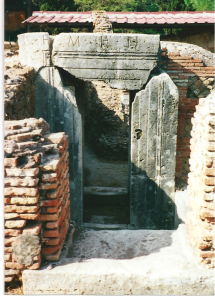




In Summary
This side trip was inspired by asking three impeccably dressed Italians in an elevator about the local restaurant options. Independent travelers step out of their comfort zone… we encourage you to ask the questions and expand your knowledge.
After all, what is the hurry… be inspired!
© Inspired Travel Itineraries with Bob and Janice Kollar
Photos © Bob and Janice Kollar


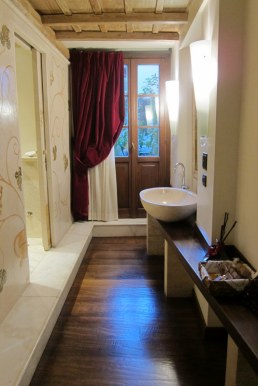



Comments